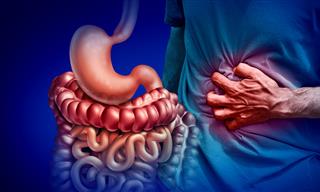More than 50% of the world's population suffers from abdominal pain, heartburn, diarrhea, and so forth, all of which result from small, harmful bacteria called Helicobacter pylori. This bacteria sits in the lining of the stomach and duodenum and impairs the stomach's resistance to its acidic environment, creating various problems and severe pain that may even prevent you from a good night's sleep, and eventually lead to ulcers and stomach cancer.
It is recommended that you familiarize yourself with the symptoms of the infection and the natural ways of treating them, in addition to the treatment given to you by the doctor, which will help reduce the pain and problems that result from them.

9 Common symptoms of Helicobacter pylori
It is difficult to be quickly diagnosed is H. pylori, because its symptoms are very general and sometimes go away after a short period of time and come back after a long period of time. If you feel that you suffer from most of these symptoms, you should go to the doctor to be tested for the bacteria.
1. Heartburn or acid reflux
Whether these symptoms appear regularly or at varying times, they may be a sign of Helicobacter pylori infection.
2. Diarrhea, constipation, gas and bloating
Because Helicobacter pylori interfere with the proper functioning of the stomach juices, the food is not digested properly and therefore you may suffer from these symptoms.
3. Nausea and vomiting
Many people who suffer from Helicobacter pylori also experience nausea and vomiting, and although these symptoms don’t always appear, they can indicate that this bacteria is present in the stomach when they appear alongside other symptoms.
4. Fatigue and low energy levels
Helicobacter pylori create a lot of stress on the body, so you may feel exhausted at all hours of the day. In addition, the body does not digest food properly and therefore does not receive the necessary nutrients from the digestive processes, which increases the feeling of fatigue and exhaustion.

5. Weight loss and loss of muscle mass
Because Helicobacter pylori affect the acidity level in the stomach, and consequently the digestion processes, the body fails to process fats and proteins properly. As a result, people with the bacteria experience weight loss caused by loss of muscle mass - this is one of the most dangerous ways to lose weight.
6. Difficulty losing weight
Surprisingly, and contrasting to the previous symptom, Helicobacter pylori can also make it difficult for you to lose weight. The reason for this is the secretion of the hormone cortisol - the stress hormone, because of the presence of the Helicobacter bacteria. This hormone causes some people to lose weight and others to gain weight, and if you recently gained excess weight in the abdominal area and simultaneously experienced loss of muscle mass, it may be a sign of infection.
7. Mood changes due to hormonal imbalance
As mentioned above, the body secretes cortisol due to the stress it is in, which can cause repeated changes in mood. In addition, the hormone serotonin, which also affects mood, is properly secreted in a body with an unaffected stomach, and any damage done to it may cause a deficiency, leading to depression and anxiety.
8. Gum disease, bad breath, and infections in the mouth
Although Helicobacter pylori live in the gastric and duodenal regions, in some patients it is also present in the oral cavity and even within the holes that exist in the teeth.
9. Stuffed nose and sinus pain
Most people are unaware of the fact that sinuses are related to the digestive tract, and any disorder that occurs in it can cause problems in them.
9 Natural Ways to Treat the Symptoms of Helicobacter Pylori
To get rid of the bacterium, you should be treated with antibiotics from your family doctor. If you suspect that you are suffering from it, ask your doctor to check you. They will most probably ask you to take a breath test to detect the presence of the bacteria in the stomach. Once the bacterium has been found, your doctor will prescribe antibiotics and antacids. Do not pass on the antibiotic treatment, however, you can supplement the treatment naturally. Here are 9 natural tips and ways to prevent the symptoms of the Helicobacter pylori infection.
1. Drink cranberry juice
Drinking cranberry juice helps prevent bacteria from sticking to the stomach, according to a study published in 2005 that recommended 250 ml of cranberry juice daily for those suffering from Helicobacter pylori.
2. Eat licorice
In India and China, it is customary to treat ulcers with licorice, and although more studies are needed to confirm its effectiveness, existing tests to prove that it has properties that help prevent the symptoms of infection and also break it off the walls of the stomach. However, for the time being it has been found that it helps best in the early stages of infection.
3. Use probiotics and prebiotics
Probiotics and prebiotics encourage the activity of the good bacteria found in our digestive system, and if you start antibiotics, you must make sure to supply your body with them. To consume probiotics, you can eat fermented foods such as kefir, kombucha tea, or yogurt. In addition, it is recommended to consume pre-biotic foods, such as onion, banana, garlic and artichoke. Include these foods in your diet at least 2-3 times a week.
4. Know what spices are good for you and which aren’t
There are spices that help slow the development of the Helicobacter pylori in the stomach and that should be added to your dishes. They include ginger, which can reduce ulcer symptoms, thyme, which has antibacterial properties, turmeric, oregano and cinnamon. In addition, it is recommended that you avoid hot spices, which aggravate the symptoms of the disease.

5. Drink green tea
A 2009 study found that green tea helps slow the development of H. pylori bacteria in the stomach and even eliminates it in some cases. Moreover, drinking green tea regularly before getting infected with the bacteria helps prevent it and protects the stomach from infection.
6. Eat broccoli
The compounds found in broccoli can counteract the activity of the Helicobacter pylori, as found in a 2009 study.
In addition to the fact that broccoli was found to help reduce stomach inflammation, it also helps reduce the population of H. pylori bacteria found in the stomach.
7. Avoid store-bought and fried foods
Most store-bought foods contain substances that cause negative side effects in people suffering from Helicobacter pylori, and although they have no direct effect on them, they do increase the distressing symptoms that patients suffer from. The longer the ingredient list, the more harmful it is to you, and it is important to avoid consuming processed and fast foods as well as snacks. Also, avoid fried food, as it also increases the symptoms of the disease.
8. Eat whole grains
Eating foods full of fiber can reduce your risk of developing ulcers and prevent the debilitating symptoms of Helicobacter pylori. Therefore, you should avoid products made from white flour and prefer to eat whole grains. To avoid annoying symptoms throughout the day, start your morning with oatmeal prepared with hot water instead of milk.
9. Beware of coffee and carbonated drinks
Even decaffeinated coffee can increase the production of gastric juices, which increases the appearance of the various symptoms caused by Helicobacter pylori. Carbonated beverages also have the same effect, so it is recommended that you drink water or herbal tea during the illness.
A few words to sum up
As mentioned above, in order to get rid of the Helicobacter pylori bacteria, you should go to the doctor and continue with the antibiotic treatment, but at the same time, it is highly recommended that you keep a healthy diet. If you don’t treat the problem, you risk developing ulcers and stomach cancer, and because the bacterium affects more than half the population, you should know the symptoms and how to catch the infection on time.
 Go to BabaMail
Go to BabaMail





























